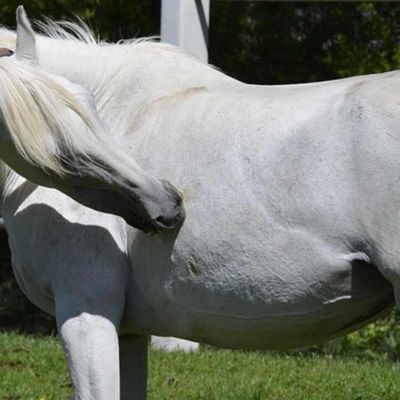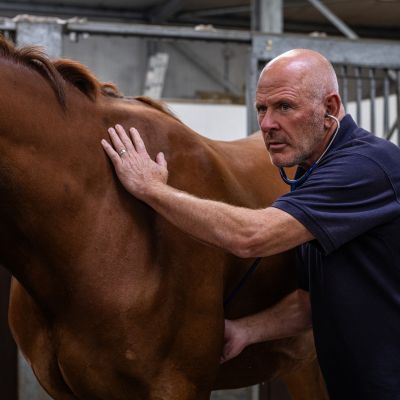Colic
Colic is a broad term for ‘pain in the abdomen’ and therefore has many different causes. It may be serious or even life-threatening, but most horses with colic recover fully and uneventfully.
COLIC
Colic is a broad term for abdominal pain & generally refers to gastrointestinal tract/gut pain.
TYPES OF COLIC:
- Spasmodic – due to feeding/management changes, parasitism (worms), stress, heat, drinking very cold water
- Impaction – similar to constipation, may be due to dry diet, dental disease, reduced water intake or box rest
- Displaced/twisted intestines – may require surgery under general anaesthesia
- Other less common causes such as tumours, infections, liver disease, grass
sickness, gastric ulcers.

DIAGNOSIS
Clinical signs of colic can include any or a combination of the following:- Pawing at ground
- Flank watching
- Kicking at belly
- Repeatedly goes down
- Rolling
- Repeatedly stretching out as if to urinate
- Decreased/absent appetite
- Decreased/absent droppings
- Sweating up
- Lip curling (flehmen)
Early diagnosis and treatment is of paramount importance. Therefore, with colic, don’t take any chances. If you notice clinical signs of colic, STAY CALM, STAY SAFE, REMOVE FOOD, CALL YOUR VET. Remember, 90% of colics are medical and respond to medical treatment.
While waiting for our vet to arrive, follow the advice that your vet has given you. We often ask, that the patient is gently walked (ideally in a sand school), if it is safe to do so.

VETERINARY TREATMENT
The gastrointestinal tract in the horse is 25-30 metres long in total and consists of the stomach, the small intestine and the large intestine. Depending on which areas are affected, clinical signs will vary in their nature and severity.
Most cases will respond to medical treatment such as painkillers, relaxants and fluids, but occasionally surgery is necessary to correct the problem.
Your vet may wish to perform an internal examination, pass a stomach tube or take a sample of blood or fluid from the abdomen in order to gather further information. In a small minority of cases, euthanasia may be the only humane option.
Please remember that, however quiet and well behaved your horse is in usual circumstances, a horse in pain may unexpectedly roll or kick out and you must consider your own safety when handling a horse with colic.
PREVENTION
- Maintain a regular management and feeding regime where possible.
- Practice effective parasite control.
- Discourage windsucking behaviour which predisposes to gas build-up.
- Provide a diet with plenty of fibre (hay, haylage or grass).
